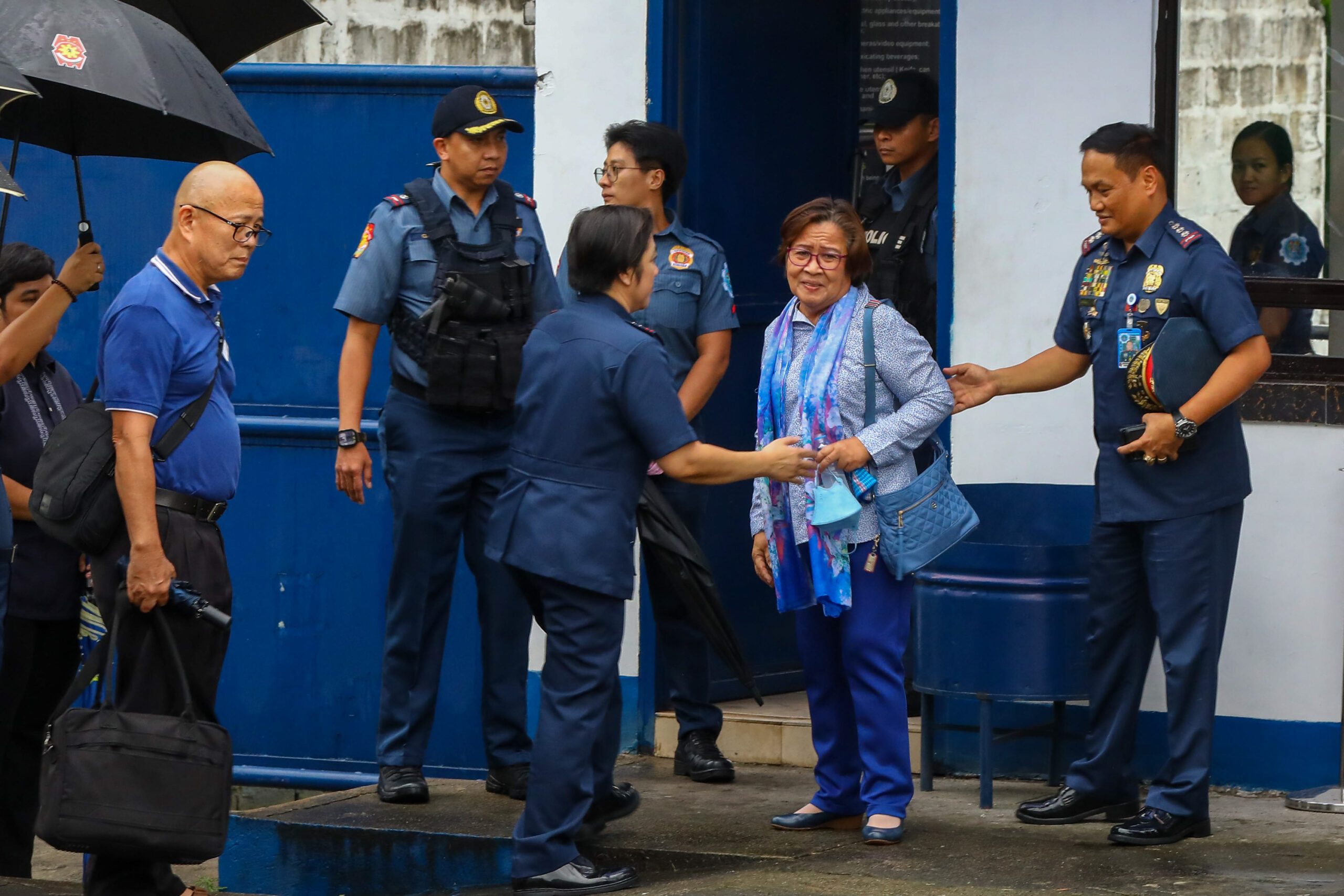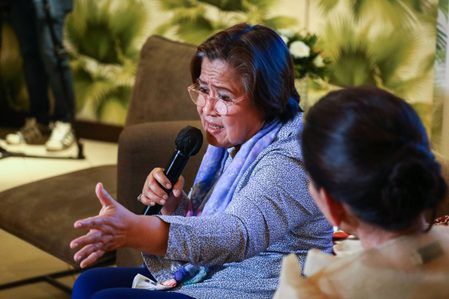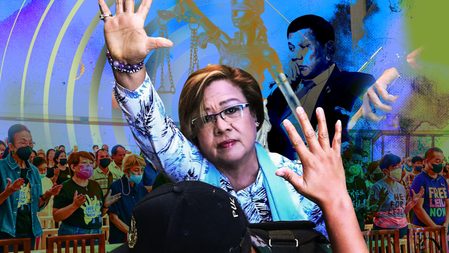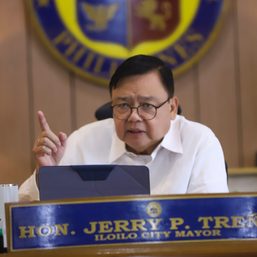SUMMARY
This is AI generated summarization, which may have errors. For context, always refer to the full article.

MANILA, Philippines – Former senator Leila de Lima’s release from detention on November 13 did not only signify her freedom, but was also a major blow to her persecutors.
Among the countless hearings she attended, De Lima appeared in the most important court function of her life on November 13 – unsure if she would attain the wish she had been praying for. Muntinlupa City Regional Trial Court (RTC) Branch Presiding Judge Gener Gito allowed De Lima and her co-accused to post bail.
Judge Gito made it simple – there was no strong evidence against De Lima so she was allowed bail. After running through the testimonies of prosecution witnesses, the judge said in his ruling that the testimonies were unable to clearly establish that conspiracy exists among the accused to commit illegal drug trading.
De Lima waited for her freedom for six years, eight months, and 21 days – or 2,454 days – not just to walk away from detention, but also to clear her name and prove that the accusations against her are baseless. Less than an hour after she was finally released from the Philippine National Police (PNP) custodial center, De Lima held her first press conference in almost seven years.
Although her case is still pending, De Lima said she believes her latest legal victory can already be considered vindication after all the humiliation and cases she weathered.
“Pero (But) you know, I’ve never lost, as I’ve said, I never lost faith and we have always been confident about the merits of my case,” De Lima said. “So, it is a legal vindication because we were always confident…This is bail, this is provisional liberty, and this is definitely a great gift from the almighty God.”
Hard-earned victory
De Lima’s latest victory can be credited to her and her untiring legal team. She and her lawyers, led by Teddy Rigoroso and Boni Tacardon, did not falter since the beginning – they were always consistent in pointing out that there was no case against the former senator in the first place.
Even retired Supreme Court senior associate justice Antonio Carpio agreed with them, adding that De Lima’s freedom was a long time coming.
“Dapat binigay itong right to bail noon pa. Kasi wala naman talagang, sabi ko walang base talaga (This right to bail should have been granted earlier. Because in the first place, I already said earlier that there was no basis for her case),” the retired magistrate told reporters two days after De Lima’s release.
Carpio, a respected lawyer and justice, noted that De Lima was “persecuted,” and not “prosecuted” because there was no strong evidence against the former senator. He explained that in criminal cases, the corpus delicti principle always applies, which simply means there must be concrete evidence of a crime committed.
But there was no strong evidence to prove De Lima’s supposed involvement in illegal drugs, Carpio argued. (READ: De Lima ruling ‘one of the grossest injustices’ – Carpio)
Amid her criticisms of former president Rodrigo Duterte and his bloody drug war, De Lima was slapped with three drug charges. The former senator was accused of allegedly extorting money from the illegal drug trade inside the New Bilibid Prison to allegedly fund her 2016 senatorial campaign.

For the duration of the case, De Lima maintained that the cases against her were trumped-up and were only meant to persecute her. That’s why De Lima, before and after her freedom, kept on saying she would fight based on the merits of the case – or evidence – because she is innocent.
Even on her quest for bail, De Lima and her lawyers insisted on continuing their legal battle by proving De Lima’s innocence through evidence and testimonies.
The administration of President Ferdinand Marcos Jr., through Department of Justice (DOJ) Secretary Jesus Crispin Remulla, earlier said they would not oppose De Lima’s bail if they invoked humanitarian grounds, but would oppose it if De Lima continued to insist on basing it on the merits of the case. However, De Lima and her camp were stubborn – they still insisted on challenging the accusations against her – and they were successful because they got the judge side with them.
Gradually, the allegations against De Lima crumbled due to the successive recantations of witnesses. As of November 2023, at least five witnesses already withdrew the allegations they hurled at De Lima.
Most notable of them are former Bureau of Corrections acting chief Rafael Ragos and alleged drug lord Kerwin Espinosa. The alleged drug lord said he was “coerced, pressured, intimidated, and seriously threatened” to make his previous allegations against De Lima. Ragos, in 2022, revealed he was forced to lie by former justice secretary Vitaliano Aguirre II – Duterte’s DOJ chief.
De Lima’s cases are now down to only one, where her bail was granted. She was acquitted in 2021 for the first case, and the second one in May 2023. In the second acquittal, the judge noted that Ragos’ recantation cast reasonable doubt on the allegations against De Lima, which warranted the former senator’s acquittal.
De Lima and justice system
When she was released, De Lima made a surprising statement – she thanked Marcos for respecting the judiciary’s independence. She said, during her press conference, that the justice system is somewhat working because of how the current administration regarded the courts.
Although she did not directly take a swipe at Duterte whose administration sent her to jail, De Lima made a statement that acknowledged the former president’s influence on the judiciary during his time: “And kasi nga (Because) I always knew that while the former president was in power, I will not be set free. Because my persecution was his project. So, how can I be set free during his term?”
Human rights lawyer Tony La Viña, part of De Lima’s support group, said it’s important for a country that the executive department does not interfere with the judiciary’s affairs. Applying that to De Lima’s case, this reported independence of the judiciary under Marcos worked in De Lima’s favor.
“But the good thing is that Marcos, the Marcos government…did not interfere with the judicial process,” La Viña said.
De Lima’s freedom was unimaginable under Duterte’s term, said Human Rights Watch (HRW) senior researcher Carlos Conde, “so we can make of whatever supposed improvements that have happened under the Marcos administration.” Conde also believes that judges can better do their jobs if they are not under assault nor under pressure.

But it had to be noted, however, that De Lima’s freedom is not a “triumph of justice at all.” It should not be forgotten that the justice system was “bastardized” to go against De Lima, Conde said.
“The way that this brutal state machinery has been used against her from 2016 onwards, I mean that is, you know, a very, very damning indictment of the whole justice system in the Philippines,” the HRW senior researcher said.
Although there were some improvements under Marcos, this could only be the incumbent President’s strategy to distinguish himself from the past administration in terms of his international image, diplomacy, and foreign policy, said Maria Ela Atienza, a political science professor at the University of the Philippines Diliman.
Contrary to its predecessor that faced international criticisms and scrutiny, the Marcos administration has been courting the international community and presenting itself as “a good global nation,” the political science professor added.
“This development in the De Lima Case can further bolster this image, presenting to the world that the rule of law and justice system work in the Philippines and the Marcos Jr. administration is not a continuity of the Duterte administration,” Atienza told Rappler.
Test for Marcos-Duterte ties
From a political perspective, De Lima’s freedom is also a test for the Marcos and Duterte alliance.
Marcos has no disagreement with De Lima, according to a former government official who has access to both camps. If there is political pressure on the former senator’s case, it is “most probably” coming from the camps of Duterte and former president, now Pampanga 2nd District Representative Gloria Macapagal-Arroyo, the former government official told Rappler earlier.
Duterte had disagreements with De Lima because of the latter’s criticism of his drug war. As for Arroyo, it was De Lima, as former justice chief, who barred her departure for abroad in 2011. This allowed the Benigno Aquino III government to prosecute her and detain her later on.
Despite these, De Lima was freed under the time of Marcos, a supposed ally of Duterte and Arroyo.
Atienza said there are already “cracks” in the Marcos and Duterte alliance, including their allies, and De Lima’s freedom “can further expose differences in priorities of the two presidents and administrations.”
Conde said it was his personal view that political pressure can help De Lima – in this case, the “open warfare” that “already manifests between the Dutertes and Marcos.”
“I think the sense among many Filipinos is that at least, the Marcos administration is pushing back against the Duterte clique and this could be read as a result of that (rift) definitely,” Conde said.
The latest development in De Lima’s case is also a signal from Marcos that Duterte’s political enemies are not his necessarily, political scientist Cleve Arguelles told Rappler. Not only that, De Lima’s freedom could also benefit Marcos’ political standing, Arguelles added.
“More likely, this may just be a case of the Marcos camp making use of the cards available to them to gain an upper hand in the ongoing feud in the Marcos-Duterte coalition. Letting the enemies of your enemies take care of your enemies is unsurprising in politics,” Arguelles explained.
“Admittedly strange, but not unprecedented. It won’t be the first time in our personality-driven and party-less democracy. It was the closest of their allies that eventually brought down the Marcos dictatorship,” the political scientist added.
De Lima’s freedom is just the start. There could be more signals from the Marcos administration, like how it will act on other pressing issues like the International Criminal Court’s probe (ICC) into Duterte and his bloody drug war.
“We should also watch closely whether this would also mean that Marcos wouldn’t object to an ICC investigation-visit to the country. The infightings in UniTeam may even push President Marcos Jr. to be an unusual ally in demanding accountability from the Duterte administration,” Arguelles said.
After all, the ball will be in the hands of Marcos. If the incumbent President chooses to cooperate with the international body, then the case proceedings against Duterte will be much easier.
And if Marcos chooses to fully challenge Duterte via the ICC, De Lima will be a strong force to contend with because she was, after all, the human rights chairperson who did a full-blown investigation that exposed the so-called Davao Death Squad. – with research from Kae Kristel Muñoz, Marie Flor Cabarrubias, Precious Altura, and Vince Therese Turqueza/Rappler.com
Kae Kristel Muñoz, Marie Flor Cabarrubias, Precious Altura, and Vince Therese Turqueza are Rappler interns. Learn more about Rappler’s internship program here.
1 comment
How does this make you feel?


![[In This Economy] Marcos’ POGO ban is popular, but will it work?](https://www.rappler.com/tachyon/2024/07/thought-leaders-marcos-pogo-ban.jpg?resize=257%2C257&crop=255px%2C0px%2C720px%2C720px)
![[Rappler Investigates] POGOs no-go as Typhoon Carina exits](https://www.rappler.com/tachyon/2024/07/newsletter-graphics-carina-pogo.jpg?resize=257%2C257&crop=424px%2C0px%2C1080px%2C1080px)





![[Vantage Point] The PDEA leaks](https://www.rappler.com/tachyon/2024/05/vantage-point-pdea-probe.jpg?resize=257%2C257&crop=255px%2C0px%2C720px%2C720px)
![[Edgewise] How Duterte can elude ICC arrest](https://www.rappler.com/tachyon/2024/05/thought-leaders-How-Duterte-elude-icc-arrest.jpg?resize=257%2C257&crop=272px%2C0px%2C720px%2C720px)


![[Just Saying] SONA 2024: Some disturbing points](https://www.rappler.com/tachyon/2024/07/TL-marcos-sona-points-july-23-2024.jpg?resize=257%2C257&crop=335px%2C0px%2C720px%2C720px)










![[Just Saying] A reawakened Supreme Court?](https://www.rappler.com/tachyon/2024/05/reawakened-supreme-court-may-21-2024.jpg?resize=257%2C257&crop=384px%2C0px%2C1080px%2C1080px)
![[OPINION] Rodrigo Duterte and his ‘unconditional love’ for China](https://www.rappler.com/tachyon/2024/04/rodrigo-duterte-xi-jinping-august-2019.jpeg?resize=257%2C257&crop=91px%2C0px%2C900px%2C900px)



![[The Slingshot] Lito Patay’s 4 hours and 38 minutes of infamy](https://www.rappler.com/tachyon/2024/07/Lito-Patay-4-hours-infamy-July-19-2024.jpg?resize=257%2C257&crop=233px%2C0px%2C720px%2C720px)




Most likely, the “invisible hands” of President Marcos Jr. are behind this incident, which was a result of the Uniteam’s rift. I agree with Cleve Arguelles: “Letting the enemies of your enemies take care of your enemies is unsurprising in politics.” This is a very good political strategy, which I believe comes from the mind of PBBM’s beloved First Lady – Liza Araneta-Marcos.